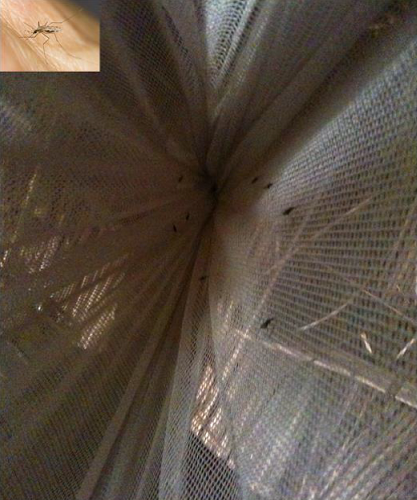
Resistance has swept through mosquito populations in southern Africa, threatening malaria prevention
A genetic analysis of mosquito populations in Africa shows that recent successes in controlling malaria through treated bednets has led to widespread insecticide resistance in mosquitoes, according to a study led by LSTM's Charles Wondji, with Kayla Barnes, Gareth Weedall and colleagues in PLOS Genetics.
Insecticide-treated bed nets and indoor spraying have been incredibly successful at preventing the spread of malaria, but their widespread use has driven mosquitoes to evolve resistance to these insecticides. By identifying genetic patterns that predict when and where resistance will evolve, scientists hope to mitigate the effects of resistance. In the current study, researchers used a combination of sequencing techniques and genetic analyses to elucidate a continent-wide population structure of a major African malaria vector, the mosquito Anopheles funestus. They identified a gene region that has allowed mosquitoes to evolutionarily adapt to insecticides by enabling them to break down commonly used pyrethroid insecticides. The resistance form of this gene has now swept through mosquito populations in southern Africa to become almost universal. This gene region has been implicated previously in insecticide resistance, but the evolutionary pressures acting on it were not fully understood. This selective sweep occurred after 2002, likely in response to increased efforts at mosquito control.
Southern African populations of mosquitoes do not appear to share genes with populations in other African areas, which may slow the spread of resistance. Overall, the study demonstrates the intense pressure that the use of pyrethroid insecticides places on mosquito populations. If this pressure and the associated increase in resistance continues, then humans will no longer be able to control malaria effectively through existing strategies.
Charles Wondji adds “Resistance to insecticides in malaria vectors threatens the success of insecticide-based interventions (e.g. insecticide-treated bednets). Unless resistance is managed, recent enormous gains in malaria transmission reduction from scaling up these interventions could be lost. By elucidating patterns of evolution of insecticide resistance in a major African malaria vector following insecticide-based interventions and generating crucial information to predict the speed and direction of the spread of resistance, this study has shed light on how mosquitoes evolutionarily respond to the massive selection pressure from insecticide-based control interventions across Africa, and provided vital information to help improve the implementation of successful control strategies. This study highlights the risk that if this level of selection and spread of resistance continues unabated, our ability to control malaria with current interventions will be compromised.
We plan to expand our research into understanding why there is a limited gene flow between African regions of this malaria vector and how it could impact the spread of resistance in the future. We also hope to use the genetic and genomic information gathered from this study to design suitable field applicable DNA-based diagnostic tools to easily detect and map the spread of resistance across the continent”.
Read the full paper at PLOS Genetics